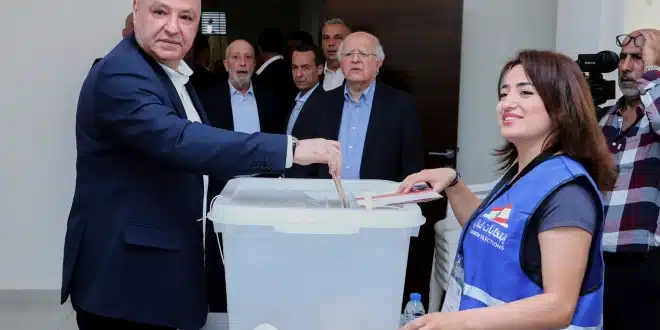President Joseph Aoun cast his vote on Saturday in his hometown of al-Aishiyeh, located in the southern Jezzine district, marking the conclusion of Lebanon’s four-phase municipal and mayoral elections. His visit to the polling station followed inspections of electoral operations in the nearby areas of Sidon and Nabatieh, where he emphasized the nation’s resolve to uphold democratic processes despite ongoing regional instability.
During his visit to Sidon, Aoun described the elections as a reflection of Lebanon’s commitment to rebuilding and resilience. Speaking later in al-Aishiyeh, the president highlighted his longstanding role in safeguarding the electoral process, noting that although he had previously served as a military officer and army commander for four decades, this was his first time casting a vote during a major electoral event.
Security Assurances and Voter Encouragement
Responding to questions about the security environment in the south, particularly following recent Israeli air operations, Aoun stated that reassurances had been received to prevent military escalation during the elections. He called on citizens to participate in high numbers, asserting that voter turnout in the south would affirm the region’s integral place within the Lebanese state and its resilience in the face of adversity.
The vote came shortly after a wave of Israeli airstrikes targeted areas in southern Lebanon. These attacks, some of the most intense in recent months, were reportedly aimed at Hezbollah positions. Although hostilities had escalated earlier in the week, a period of relative calm returned by Friday morning, suggesting that diplomatic efforts may have contributed to de-escalating tensions to allow the electoral process to proceed.
Election Context and Political Significance
This final round of municipal elections is part of a broader national initiative to re-establish local governance and reinforce civic administration following a period of prolonged instability. Municipal polls offer citizens the opportunity to influence leadership in local councils and mayoral offices, with implications for public services, community development, and political representation.
The elections also come at a time of heightened scrutiny over the influence of non-state actors in Lebanese politics. Results in the southern regions are likely to reflect the standing of major political groups, including Hezbollah and its allies, and may provide insight into broader shifts in public sentiment amid ongoing economic and social challenges.
By overseeing the electoral preparations and participating directly in the vote, President Aoun underscored the importance of continuity in democratic governance. His remarks sought to rally national unity and encourage public engagement, particularly in areas that have recently experienced conflict-related disruptions.
As Lebanon continues to manage a delicate balance between regional pressures and internal reforms, the successful execution of these elections may serve as a foundation for future political stability and institutional renewal.


